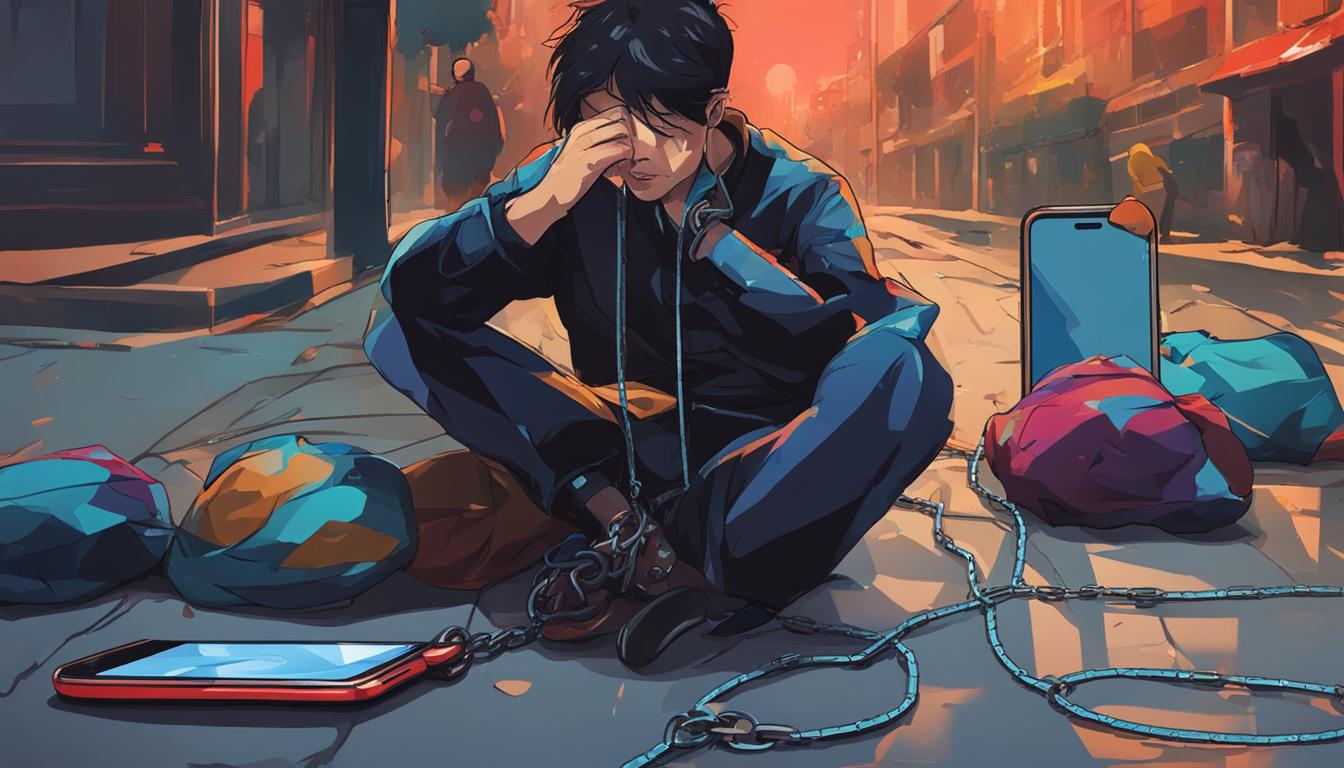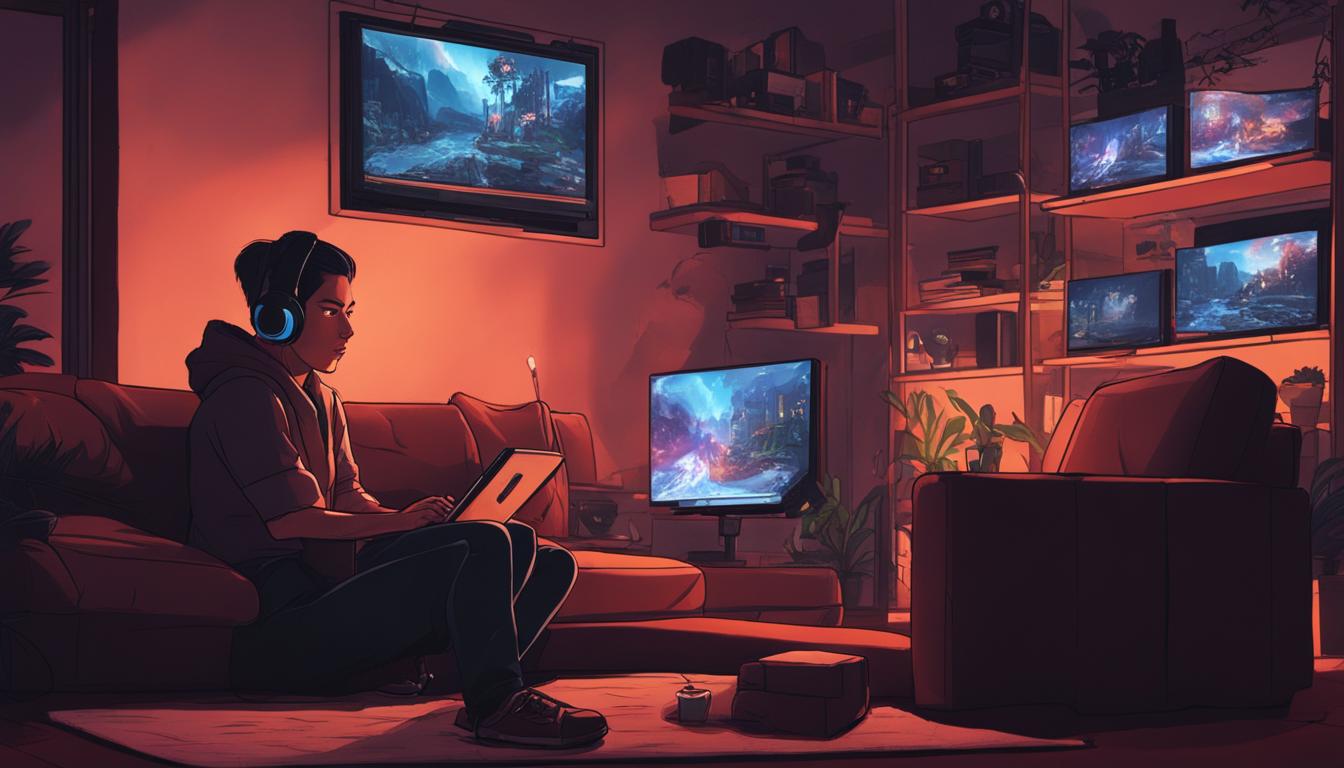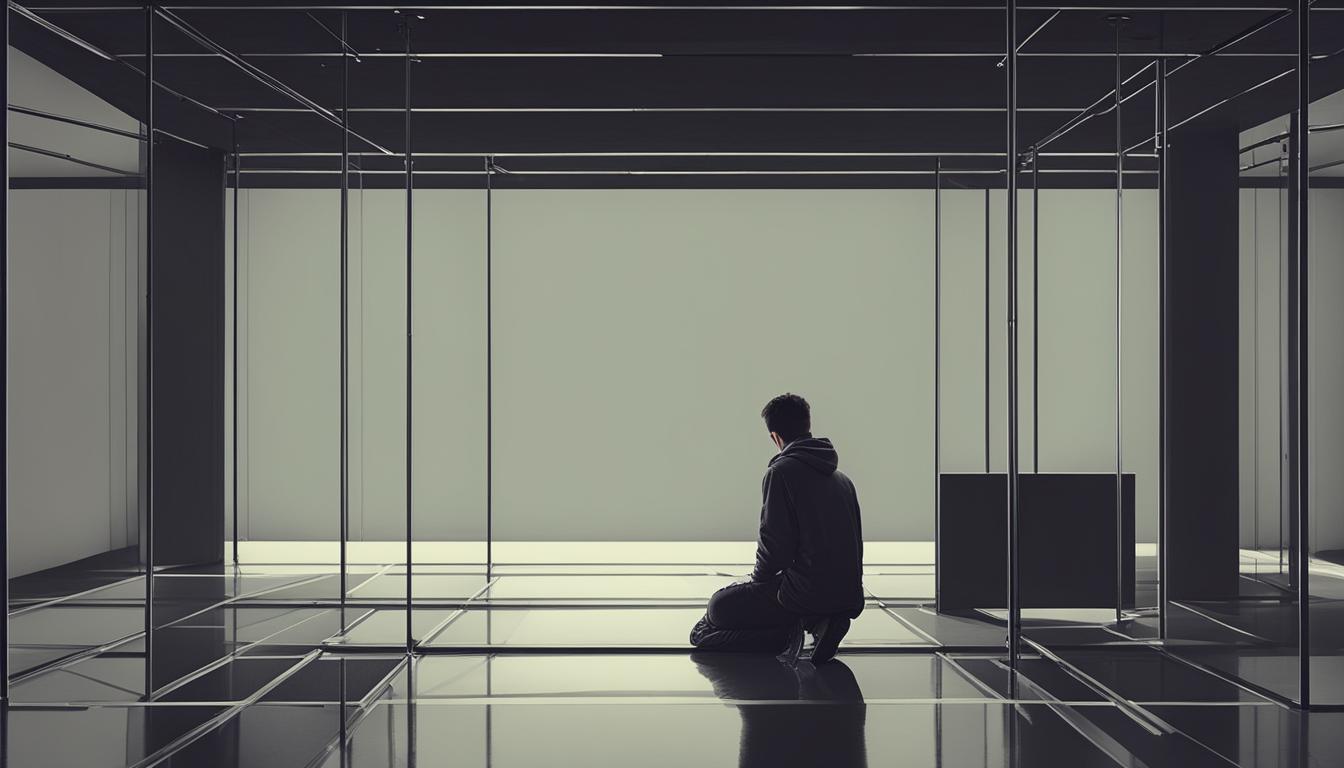Are you feeling overwhelmed by constant screen time and digital distractions? It may be time for a digital detox. Taking a break from technology can have a positive impact on your mental health and well-being. Research shows that a digital detox can reduce symptoms of depression and offer various mental health benefits. By intentionally reducing your screen time and practicing mindful technology use, you can improve your overall well-being and find a healthier balance in your relationship with technology.
Key Takeaways:
- Engaging in a digital detox can lead to a reduction in symptoms of depression and anxiety.
- Mindful technology use can enhance focus, productivity, and overall mental well-being.
- Digital detoxes can improve sleep quality and foster more meaningful connections in real life.
- Setting boundaries and finding alternative activities can help create a healthier relationship with technology.
- Seeking professional help is advisable if excessive technology use is negatively impacting your mental health.
The Impact of Technology on Mental Health
Excessive use of technology has been associated with negative effects on mental health. Spending too much time on screens and engaging in activities such as social media can lead to issues like anxiety, depression, and impaired emotional and social intelligence.
“Technology addiction is a growing concern in today’s society,” says Dr. John Smith, a renowned psychologist.
“Constantly checking our phones and being glued to screens not only affects our mental well-being but also hinders our ability to connect with others in meaningful ways.”
This overreliance on technology can result in social isolation and disrupted sleep patterns, further exacerbating mental health problems.
However, it’s important to note that the effects of technology on mental health can vary depending on how and why someone uses it. While passive use of social media and excessive screen time can contribute to negative mental health outcomes, active and intentional use can have positive effects, such as building and maintaining connections.
In order to maintain a healthy relationship with technology, it’s crucial for individuals to find a balance and be mindful of their technology use. By setting limits, engaging in alternative activities, and fostering face-to-face interactions, we can mitigate the detrimental effects of technology on mental health and promote a more balanced and fulfilling life.

The Effects of Digital Overload
- Increased anxiety and depression
- Impaired emotional and social intelligence
- Social isolation
- Disrupted sleep patterns
Finding Balance in a Digital World
- Set limits on screen time
- Engage in alternative activities
- Foster face-to-face interactions
Why Consider a Digital Detox?
There are several reasons why you should consider a digital detox. Taking a break from technology can have numerous benefits for your mental health and overall well-being. Here are some of the key advantages:
- Anxiety Reduction: By disconnecting from electronic devices and the constant notifications, you can experience a significant reduction in anxiety levels.
- Depression Reduction: Taking a break from technology can help alleviate symptoms of depression and improve your mood.
- Improved Sleep Quality: Excessive screen time before bed can disrupt your sleep patterns. By disconnecting from technology, you can improve the quality of your sleep and wake up feeling more refreshed.
- Enhanced Focus: Constant distractions from smartphones and social media can hinder your ability to focus on tasks. A digital detox allows you to regain your focus and concentrate better.
- Increased Productivity: When you eliminate the time spent on mindless scrolling and browsing, you can redirect your energy and attention towards more productive activities.
- Meaningful Connections: By reducing your reliance on technology, you have the opportunity to engage in more meaningful connections and interactions with the people around you.
By taking the time to disconnect from technology and engage in a digital detox, you can experience these benefits and bring more balance into your life. It’s important to remember that a digital detox doesn’t mean completely eliminating technology from your life, but rather finding a healthier and more mindful relationship with it.

Signs You Need a Digital Detox
Are you constantly checking your phone, feeling anxious when you’re away from your devices, or experiencing poor concentration and disrupted sleep? These could be signs that you need a digital detox. Recognizing the signs of technology addiction and its impact on your mental health is the first step towards reclaiming control over your digital habits.
Social withdrawal is a common sign of excessive technology use. If you find yourself isolating from real-life interactions and spending more time online, it may be time for a digital detox. Poor concentration and decreased productivity can also indicate the need for a break from screens. If you’re struggling to stay focused and are easily distracted by notifications and compulsive device checking, it’s a clear indication that your relationship with technology may be unhealthy.
Disrupted sleep patterns are another sign that a digital detox is in order. The blue light emitted by screens can interfere with your body’s natural sleep-wake cycle, making it harder to fall asleep and stay asleep. If you find yourself mindlessly scrolling through social media late into the night, it’s time to step back and prioritize your sleep.
“Checking your phone every two minutes is not a normal behavior. If you feel anxious or restless when you’re not using your phone, it could be a sign of technology-related anxiety. Taking a digital detox can help you regain a sense of control and reduce your reliance on digital devices.”
Recognizing the signs:
- Social withdrawal and isolation
- Poor concentration and decreased productivity
- Disrupted sleep patterns
If any of these signs resonate with you, it’s time to consider taking a break from technology and engaging in a digital detox. By disconnecting from your devices, you can restore balance in your life, improve your mental well-being, and regain control over your technology use.

How to Do a Digital Detox
If you’re ready to try a digital detox, here are some tips to help you get started:
- Set realistic goals: Start by setting goals that align with your lifestyle and commitments. Determine which activities you want to abstain from or limit, and create a plan that works for you.
- Create healthy boundaries: Establish boundaries for when and how you use technology. Consider designating screen-free times, such as before bed, during meals, or when spending time with loved ones.
- Find alternative activities: Instead of relying on technology, find alternative activities that bring you joy and help you unwind. This could include picking up a new hobby, going for a walk, calling a family member, meeting a friend for coffee, or reading a book.
- Be intentional: Be mindful of how you use technology and designate specific periods for checking emails or social media. By being intentional with your screen time, you can have a more focused and mindful engagement.
Remember, the goal of a digital detox is to use technology in a way that benefits you and allows for a healthier relationship with digital devices. By incorporating these tips into your detox plan, you can take a step towards a more mindful and balanced use of technology.
The Benefits of a Digital Detox
Taking a digital detox can have a significant positive impact on your mental health and overall well-being. Research has shown that disconnecting from technology can lead to reduced anxiety and depression, allowing you to experience a greater sense of calm and tranquility in your daily life.
When you take a break from digital devices, you can enhance your focus and increase your productivity by eliminating distractions. Without the constant notifications and interruptions from emails, text messages, and social media, you can concentrate better on the tasks at hand and achieve more in less time.
Improved sleep is another valuable benefit of a digital detox. By reducing your exposure to blue light and establishing a relaxing bedtime routine that doesn’t involve electronic devices, you can enjoy deeper, more restful sleep, leading to increased energy and mental clarity during the day.
Perhaps one of the most rewarding advantages of a digital detox is the opportunity to foster meaningful connections in real life. Without the constant presence of screens, you can engage more fully with the people around you and cultivate deeper, more authentic relationships. This can bring a sense of joy and fulfillment to your life that is hard to replicate through digital interactions alone.
Summary:
- Reduced anxiety and depression
- Enhanced focus and productivity
- Improved sleep quality
- Meaningful connections and increased joy
The Downsides of a Digital Detox
In this digital age, where technology is an integral part of our lives, taking a break from digital devices may come with some downsides. Let’s explore the potential challenges of a digital detox:
- Fear of Missing Out (FOMO): Disconnecting from technology may trigger a fear of missing out on important news, updates, or social events. The constant stream of information on social media platforms can create a sense of anxiety and the fear of being left out.
- Social Disconnection: Being away from technology can lead to a temporary sense of social disconnection. With digital tools as a primary mode of communication, not being constantly connected can make individuals feel isolated or disconnected from their social circles.
- Breaking Old Habits: Detoxing from technology requires breaking old habits associated with excessive device use. This can be challenging and may lead to feelings of anxiety or boredom as individuals try to find alternative ways to fill the time previously dedicated to digital engagement.
- Feelings of Anxiety and Boredom: During a digital detox, some individuals may experience feelings of anxiety or boredom due to the absence of constant digital stimulation. The reliance on technology for entertainment and distraction can make it difficult to adjust to the quiet moments of a detox.

Despite these potential downsides, the benefits of a digital detox often outweigh the temporary challenges. By finding alternative ways to stay informed and connected, setting healthy boundaries, and being patient with the adjustment process, individuals can successfully navigate the potential downsides and embrace the positive effects of a digital detox.
Incorporating Digital Detoxing into Daily Life
When it comes to making a digital detox a habit, starting small is key. Begin by setting achievable goals that align with your lifestyle and commitments. Consider which activities you want to abstain from or limit, and create healthy boundaries for when and how you use technology. This could involve designating screen-free times before bed, during meals, or when spending time with loved ones.
To be successful in your digital detox, it’s important to be intentional with your screen time. Set specific periods for checking emails or social media and practice focused and mindful engagement during those times. By being aware of your technology use and making deliberate choices, you can create a healthier relationship with digital devices.
Additionally, finding alternative activities can help fill the void left by reduced technology use. Engage in hobbies that bring you joy and help you unwind, such as reading, journaling, or spending time in nature. By replacing screen time with meaningful and fulfilling activities, you’ll be more likely to stick to your digital detox goals and create a habit of disconnecting from technology.
Seeking Professional Help
If you find that your technology use is interfering with your daily functioning, self-esteem, or overall mental health, it may be beneficial to seek professional help. Mental health professionals can provide guidance and support in managing technology addiction and addressing any detrimental effects of excessive technology use. They can also help individuals navigate self-esteem issues that may arise from comparing themselves to others on social media. If you feel overwhelmed or unable to manage your technology use on your own, don’t hesitate to reach out for professional assistance.

“Technology can have a profound impact on our mental health, and sometimes it can be difficult to navigate on our own,” says Dr. Emily Smith, a licensed psychologist specializing in digital wellness. “Seeking professional help is a courageous step towards improving your well-being and finding a healthier balance with technology.”
During therapy sessions, mental health professionals can help individuals identify the underlying causes of their technology use and develop strategies to manage it effectively. Treatment may involve cognitive-behavioral therapy, which aims to change negative thought patterns and behaviors associated with technology addiction. Additionally, therapists can assist in addressing any co-occurring mental health issues, such as anxiety or depression, that may be exacerbated by excessive technology use.
Remember, seeking professional help is a sign of strength and a proactive approach to taking control of your mental health. Don’t hesitate to reach out if you feel you could benefit from the support and guidance of a mental health professional.
Conclusion
In conclusion, a digital detox can offer numerous benefits for improving mental health and achieving a better balance in our technology use. By consciously disconnecting from technology, we can reduce feelings of anxiety and depression, enhance our focus and productivity, improve the quality of our sleep, and foster more meaningful connections in real life.
It is important to practice mindful technology use, being intentional about how and when we engage with our devices. While technology is a valuable tool, it is crucial to take regular breaks and engage in a digital detox to prioritize our mental health and create a healthier relationship with technology. By setting healthy boundaries and finding alternative activities, we can develop a better balance in our lives and regain control over our time and attention.
Remember, a digital detox is not about completely eliminating technology from our lives, but rather about finding a harmony between our digital and offline experiences. By incorporating regular digital detoxes into our routines, we can improve our overall well-being and enjoy the benefits of a more mindful and intentional approach to technology use. So, let’s take the time to unplug, recharge, and prioritize our mental health in this digital age.
FAQ
What is a digital detox?
A digital detox involves abstaining or intentionally reducing time spent using electronic devices such as smartphones, computers, TVs, and tablets, as well as avoiding activities like checking emails, text messages, playing video games, watching TV, and using social media.
What is a social media detox?
A social media detox is a popular form of digital detox that involves refraining from using social media platforms to improve overall well-being.
What are the benefits of a digital detox?
A digital detox can lead to reduced anxiety and depression, enhanced focus and productivity, improved sleep, more meaningful connections in real life, and more time for activities that bring joy.
How does excessive technology use affect mental health?
Excessive use of technology, including social media, can lead to issues such as anxiety, depression, impaired emotional and social intelligence, technology addiction, social isolation, and disrupted sleep patterns.
How do I know if I need a digital detox?
Signs that you may need a digital detox include anxiety, stress, or depression after checking social media, social withdrawal, frequent phone checking, difficulty staying focused, disrupted sleep, and feeling obligated to immediately respond to emails and text messages.
How can I do a digital detox?
To do a digital detox, you can start by setting realistic goals, creating healthy boundaries for technology use, finding alternative activities, and incorporating screen-free times into your routine.
What are the benefits of a digital detox?
Taking a digital detox can lead to reduced anxiety and depression, enhanced focus and productivity, improved sleep quality, and more meaningful connections in real life.
Are there any downsides to a digital detox?
Downsides of a digital detox may include a fear of missing out, temporary social disconnection, breaking old habits, and feelings of anxiety or boredom. However, the benefits of a digital detox often outweigh these downsides.
How can I incorporate digital detoxing into my daily life?
You can make digital detoxing a habit by starting small, setting boundaries, being intentional with your screen time, and finding alternative activities that bring you joy and help you unwind.
Should I seek professional help for technology addiction?
If your technology use is interfering with your daily functioning, self-esteem, or overall mental health, it may be beneficial to seek professional help. Mental health professionals can provide guidance and support in managing technology addiction and addressing any detrimental effects of excessive technology use.


